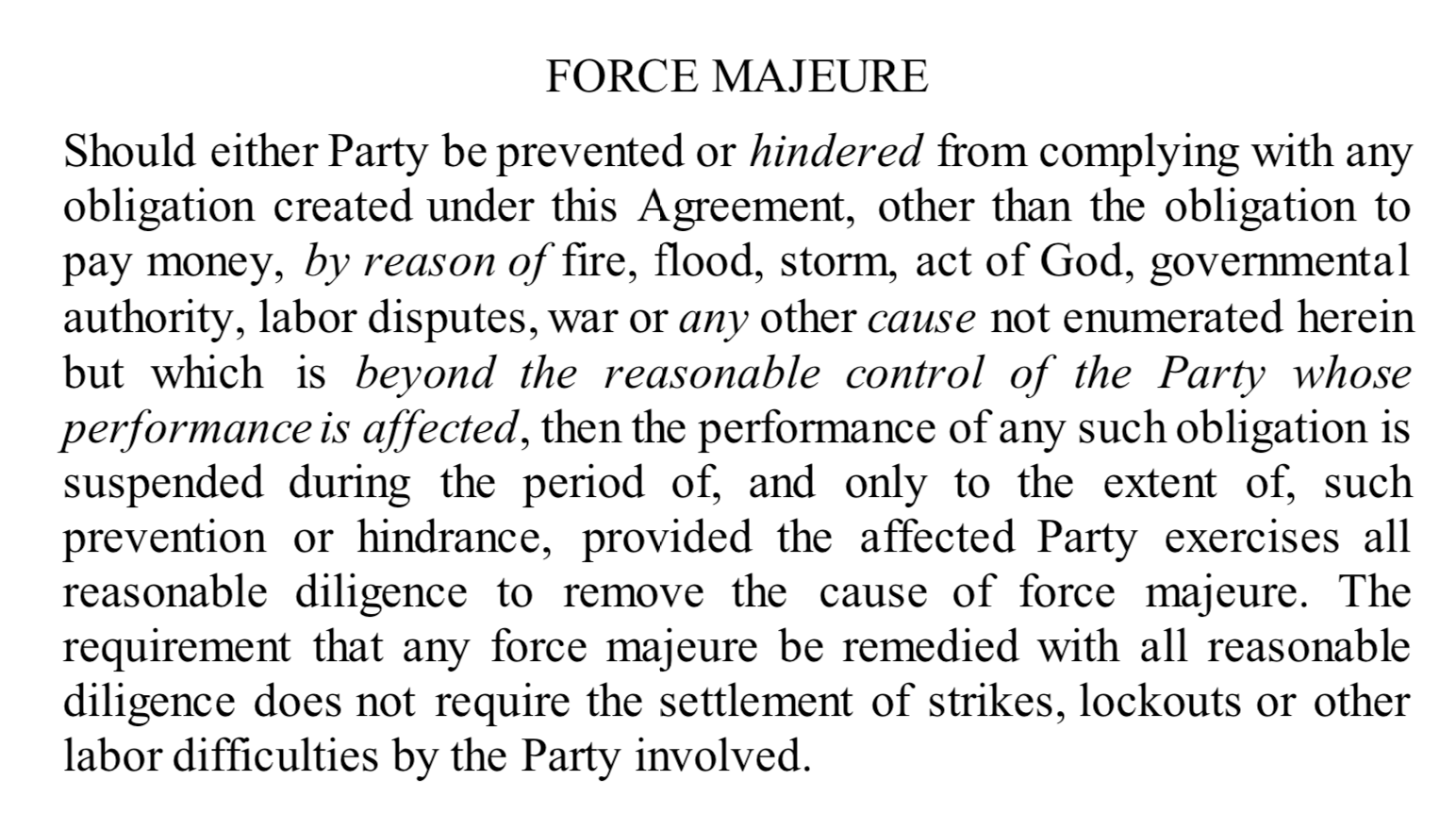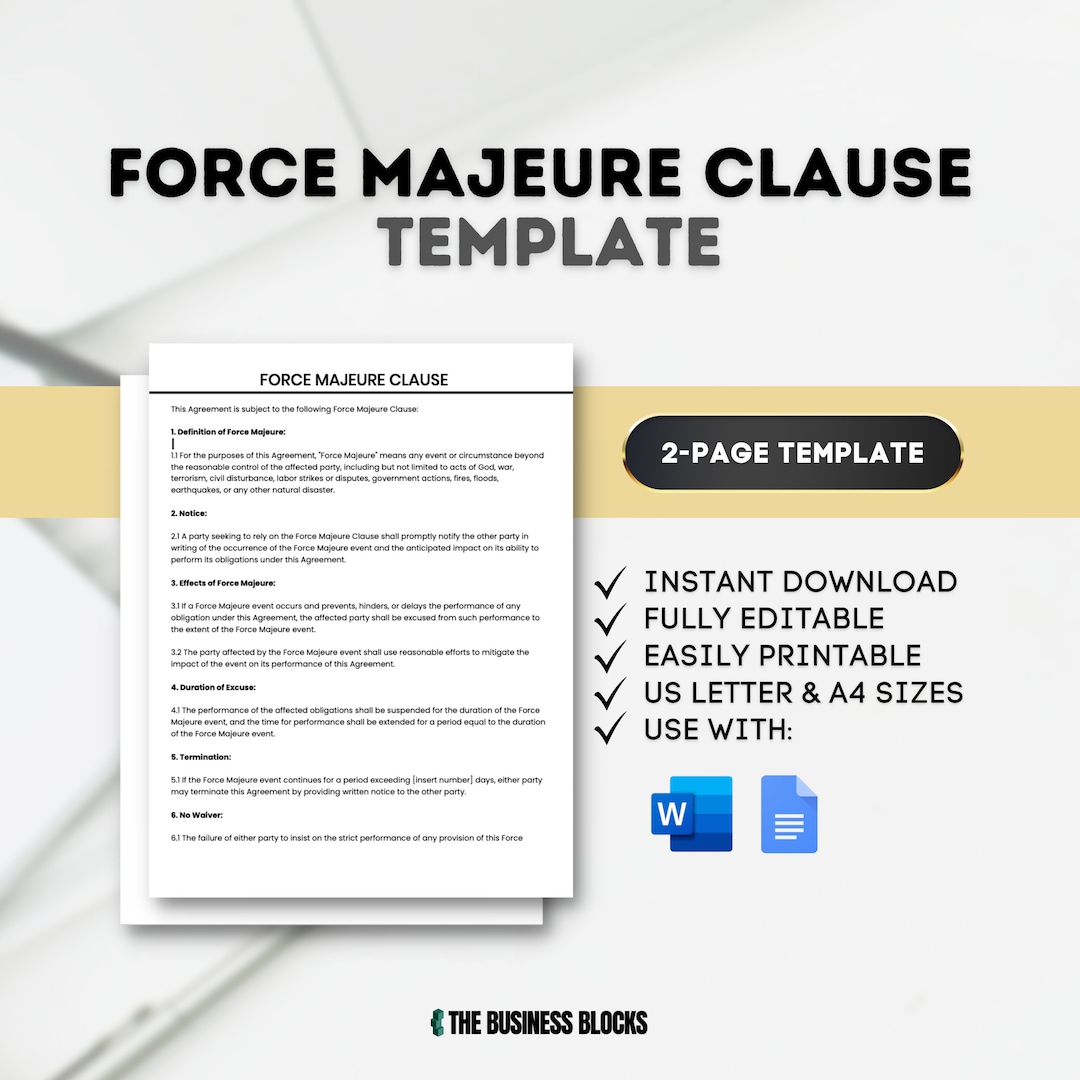Web force majeure clauses allow a party to leave a contract temporarily or permanently, in whole or in part, for catastrophes that were not foreseeable. Web force majeure refers to unforeseeable, unavoidable and insurmountable objective circumstances when the agreement is entered into. Certain events, beyond the control of the parties, may inhibit the parties from fulfilling their duties and obligations under the project agreements. Such circumstances include war, riot, crime, or strike, as well as any event considered an “act of god,” such as an earthquake, hurricane. Web force majeure clauses may require either (i) a minimum amount of notice ahead of an event contemplated by the contract, or (ii) notice within a certain number of days of the triggering event.
Web force majeure clauses allow a party to leave a contract temporarily or permanently, in whole or in part, for catastrophes that were not foreseeable. Web force majeure clauses may require either (i) a minimum amount of notice ahead of an event contemplated by the contract, or (ii) notice within a certain number of days of the triggering event. Web force majeure clauses checklist and sample wording. Web a force majeure clause in a contract essentially releases both parties from obligation or liability when a circumstance beyond the parties’ control occurs preventing fulfillment of the contract. Web force majeure is defined as acts of god, war, fires, explosions, hurricanes, floods, failure of transportation, or other causes that are beyond the reasonable control of either party and that by exercise of due foresight such party could not reasonably have been expected to avoid, and which, by the exercise of all reasonable due diligence, such.
Web search force majeure contract clauses from contracts filed with the securities and exchange commission. Such circumstances include war, riot, crime, or strike, as well as any event considered an “act of god,” such as an earthquake, hurricane. Web force majeure clauses allow a party to leave a contract temporarily or permanently, in whole or in part, for catastrophes that were not foreseeable. Web a force majeure clause in a contract essentially releases both parties from obligation or liability when a circumstance beyond the parties’ control occurs preventing fulfillment of the contract. Contractor shall be excused from performance hereunder during the time and to the extent that it is prevented from obtaining delivery, or performing by act of god, fire, strike,.
Web force majeure clauses checklist and sample wording. Web force majeure clauses allow a party to leave a contract temporarily or permanently, in whole or in part, for catastrophes that were not foreseeable. Web force majeure is defined as acts of god, war, fires, explosions, hurricanes, floods, failure of transportation, or other causes that are beyond the reasonable control of either party and that by exercise of due foresight such party could not reasonably have been expected to avoid, and which, by the exercise of all reasonable due diligence, such. Such circumstances include war, riot, crime, or strike, as well as any event considered an “act of god,” such as an earthquake, hurricane. Certain events, beyond the control of the parties, may inhibit the parties from fulfilling their duties and obligations under the project agreements. Contractor shall be excused from performance hereunder during the time and to the extent that it is prevented from obtaining delivery, or performing by act of god, fire, strike,. Web a force majeure clause in a contract essentially releases both parties from obligation or liability when a circumstance beyond the parties’ control occurs preventing fulfillment of the contract. These catastrophes must cause severe disruption to fulfill a contractual obligation. Web search force majeure contract clauses from contracts filed with the securities and exchange commission. Web force majeure refers to unforeseeable, unavoidable and insurmountable objective circumstances when the agreement is entered into. Web force majeure clauses may require either (i) a minimum amount of notice ahead of an event contemplated by the contract, or (ii) notice within a certain number of days of the triggering event.
Web Force Majeure Is Defined As Acts Of God, War, Fires, Explosions, Hurricanes, Floods, Failure Of Transportation, Or Other Causes That Are Beyond The Reasonable Control Of Either Party And That By Exercise Of Due Foresight Such Party Could Not Reasonably Have Been Expected To Avoid, And Which, By The Exercise Of All Reasonable Due Diligence, Such.
Web force majeure refers to unforeseeable, unavoidable and insurmountable objective circumstances when the agreement is entered into. Web a force majeure clause in a contract essentially releases both parties from obligation or liability when a circumstance beyond the parties’ control occurs preventing fulfillment of the contract. Web search force majeure contract clauses from contracts filed with the securities and exchange commission. Contractor shall be excused from performance hereunder during the time and to the extent that it is prevented from obtaining delivery, or performing by act of god, fire, strike,.
Web Force Majeure Clauses May Require Either (I) A Minimum Amount Of Notice Ahead Of An Event Contemplated By The Contract, Or (Ii) Notice Within A Certain Number Of Days Of The Triggering Event.
Certain events, beyond the control of the parties, may inhibit the parties from fulfilling their duties and obligations under the project agreements. These catastrophes must cause severe disruption to fulfill a contractual obligation. Web force majeure clauses allow a party to leave a contract temporarily or permanently, in whole or in part, for catastrophes that were not foreseeable. Web force majeure clauses checklist and sample wording.









